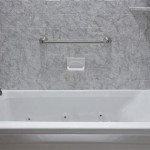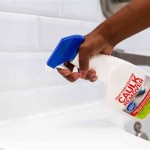Acrylic vs. Cast Iron Bathtubs: Essential Aspects for an Informed Decision
When it comes to selecting a bathtub, two popular options stand out: acrylic and cast iron. Each material offers unique advantages and considerations, so understanding their key differences is crucial for making an informed decision. Here's a comprehensive comparison to help you navigate your choice:
Material Composition and Durability
Acrylic: Acrylic bathtubs are made from a thermoplastic polymer material that is lightweight, non-porous, and resistant to scratches and stains. They are typically reinforced with fiberglass for added strength.
Cast Iron: Cast iron bathtubs are crafted from a heavy and durable metal alloy, making them incredibly sturdy and resistant to warping or denting. Their enamel coating provides a smooth, non-porous surface that is easy to clean and maintain.
Weight and Installation
Acrylic: Acrylic bathtubs are significantly lighter than cast iron, making them easier to handle and install. They can be placed on a standard subfloor without additional support.
Cast Iron: Cast iron bathtubs are extremely heavy, requiring additional support during installation. They typically need a reinforced subfloor or specialized platforms to accommodate their weight.
Heat Retention and Insulation
Acrylic: Acrylic bathtubs have excellent heat-retaining properties, allowing you to enjoy a warm and relaxing bath for longer periods. However, they tend to lose heat faster than cast iron.
Cast Iron: Cast iron bathtubs are renowned for their exceptional heat retention. They absorb heat slowly but release it gradually, providing a consistent and cozy bathing experience.
Aesthetics and Customization
Acrylic: Acrylic bathtubs offer a wider range of colors, shapes, and designs, allowing for greater flexibility in customization. They can mimic the look of natural stone or tile, providing a modern and stylish touch.
Cast Iron: Cast iron bathtubs come in a more limited range of colors and designs. However, their classic and elegant aesthetic adds a timeless charm to any bathroom.
Maintenance and Repair
Acrylic: Acrylic bathtubs are relatively easy to clean and maintain. Minor scratches or stains can be buffed out with a mild abrasive cleaner. However, more significant damage may require professional repair.
Cast Iron: Cast iron bathtubs are highly durable, but their enamel coating can be susceptible to chipping or cracking. Repairs may involve repainting or re-enameling, which can be costly and time-consuming.
Cost Comparison
Acrylic: Acrylic bathtubs are generally more affordable than cast iron models. They offer a cost-effective option for those seeking a stylish and modern look.
Cast Iron: Cast iron bathtubs are more expensive than acrylic ones. However, their durability, heat retention, and timeless aesthetic make them a worthwhile investment for those prioritizing longevity and quality.

4 Common Bathtub Materials Pros Cons What To Buy For Your Bathroom
Acrylic Bathtubs Vs Cast Iron Which Is Right For You

Acrylic Bathtub Vs Cast Iron Tub Comparison

Acrylic Vs Cast Iron Signature Hardware

Acrylic Vs Cast Iron Tub An Easy Choice Bathtubber

Acrylic Bathtub Vs Cast Iron Tub Comparison

Acrylic Vs Cast Iron Tub Which Is Better

Fixr Com Acrylic Vs Cast Iron Clawfoot Tub Pros Cons Comparisons And Costs
Acrylic Bathtubs Vs Cast Iron Which Is Right For You

What Is An Acrylic Tub Beginners Guide To Tubs 2024








